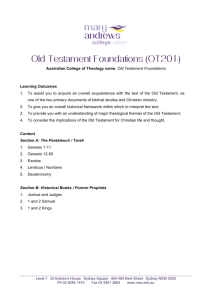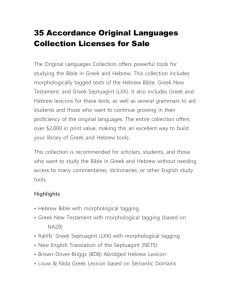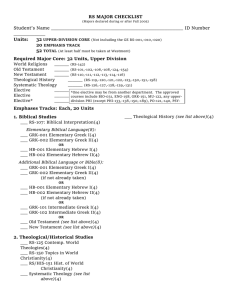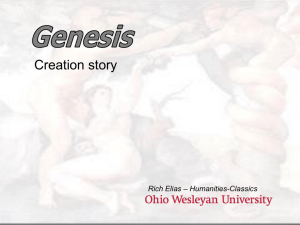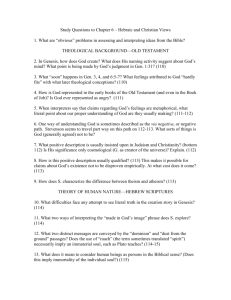some basic definitions
advertisement
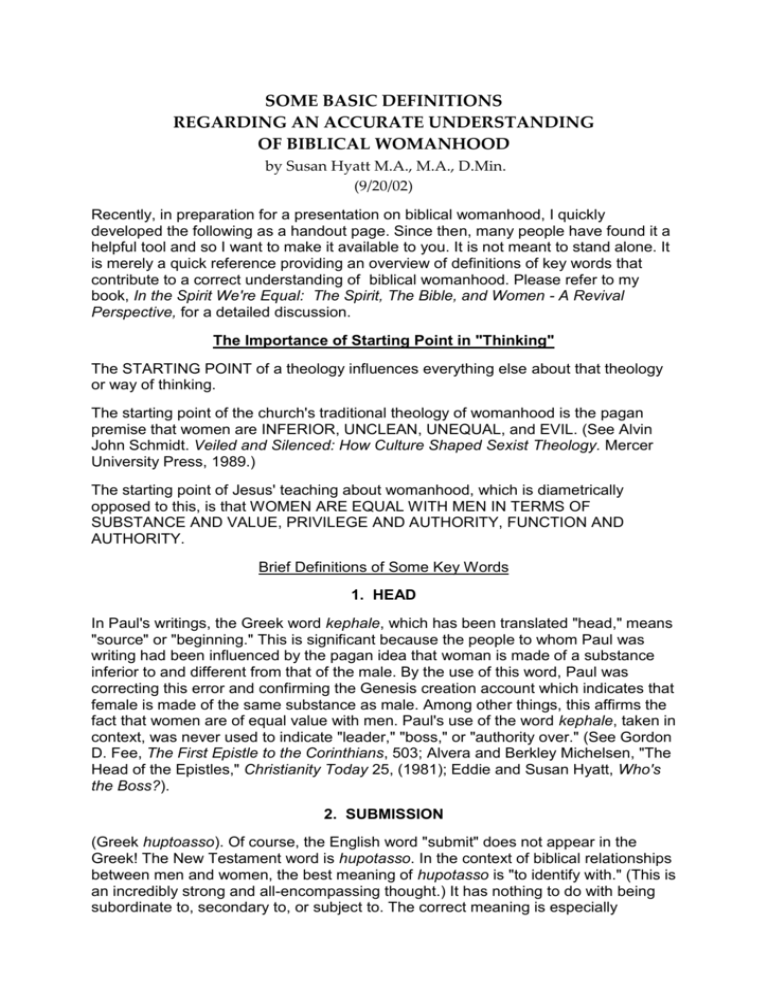
SOME BASIC DEFINITIONS REGARDING AN ACCURATE UNDERSTANDING OF BIBLICAL WOMANHOOD by Susan Hyatt M.A., M.A., D.Min. (9/20/02) Recently, in preparation for a presentation on biblical womanhood, I quickly developed the following as a handout page. Since then, many people have found it a helpful tool and so I want to make it available to you. It is not meant to stand alone. It is merely a quick reference providing an overview of definitions of key words that contribute to a correct understanding of biblical womanhood. Please refer to my book, In the Spirit We're Equal: The Spirit, The Bible, and Women - A Revival Perspective, for a detailed discussion. The Importance of Starting Point in "Thinking" The STARTING POINT of a theology influences everything else about that theology or way of thinking. The starting point of the church's traditional theology of womanhood is the pagan premise that women are INFERIOR, UNCLEAN, UNEQUAL, and EVIL. (See Alvin John Schmidt. Veiled and Silenced: How Culture Shaped Sexist Theology. Mercer University Press, 1989.) The starting point of Jesus' teaching about womanhood, which is diametrically opposed to this, is that WOMEN ARE EQUAL WITH MEN IN TERMS OF SUBSTANCE AND VALUE, PRIVILEGE AND AUTHORITY, FUNCTION AND AUTHORITY. Brief Definitions of Some Key Words 1. HEAD In Paul's writings, the Greek word kephale, which has been translated "head," means "source" or "beginning." This is significant because the people to whom Paul was writing had been influenced by the pagan idea that woman is made of a substance inferior to and different from that of the male. By the use of this word, Paul was correcting this error and confirming the Genesis creation account which indicates that female is made of the same substance as male. Among other things, this affirms the fact that women are of equal value with men. Paul's use of the word kephale, taken in context, was never used to indicate "leader," "boss," or "authority over." (See Gordon D. Fee, The First Epistle to the Corinthians, 503; Alvera and Berkley Michelsen, "The Head of the Epistles," Christianity Today 25, (1981); Eddie and Susan Hyatt, Who's the Boss?). 2. SUBMISSION (Greek huptoasso). Of course, the English word "submit" does not appear in the Greek! The New Testament word is hupotasso. In the context of biblical relationships between men and women, the best meaning of hupotasso is "to identify with." (This is an incredibly strong and all-encompassing thought.) It has nothing to do with being subordinate to, secondary to, or subject to. The correct meaning is especially important and clear when considered against the cultural backdrop, that is to say, when it is understood in the light of the marriage customs and the culture of the people to whom Paul was writing. (See Bauer's Greek-English Lexicon; S. Hyatt, In the Spirit We're Equal, 255-59; Edwin Stewart, Submission and Headship: Our Ridiculous Interpretation, and E. & S. Hyatt, Who's the Boss?) 3. COVERING "Covering" is a covenant word. No more. No less. In the Old Testament, it refers to the blood of bulls and goats to COVERING OVER sin. In the New Testament, it refers to the Blood of Jesus Christ REMOVING sin. The currently popular teaching about "covering" arose in the Charismatic Renewal to refer to someone being a covering of safety and protection for those under them. It has now assumed the popular secular terminology of "accountability person." These teachings on "covering" have no legitimate basis in Scripture. God is Our Refuge and Safety! The Blood of Jesus is our only "covering." But the perverted, popular teaching, often used to exercise control, is drawn from 1 Corinthians 11, especially verse 10, where Paul literally says, "For this reason, a woman ought to have authority over (on) her head because of the angels." In this passage, Paul is actually affirming the right and personal responsibility of Christian women in Corinth to be free to choose whether to abide by the local custom of wearing head coverings (hats, veils, shawls, whatever!) or to dispense with this custom. In other words, he is saying that they have authority over their own heads. 4. AUTHORITY Re: authentein in 1Timothy 2:12. This word is found only in this one place in the New Testament and refers to someone who claims to be the author or originator of something or someone. Paul is countering the early gnostic teaching of creation which portrayed Eve as the one who instructed Adam and gave him life. According to this strange doctrine, since Eve was the authentein of the human race, her daughters were also to be considered the authentein of their generations, supposedly giving them a priority or primacy over men in all of life. 5. HELPER Re: Hebrew ezer kenegdo. In Genesis 2:28, the word "helpmeet" does not occur. The Hebrew expression ezer kenegdo appears, meaning "one who is the same as the other and who surrounds, protects, aids, helps, supports." There is no indication of inferiority or of a secondary position in an hierarchical separation of the male and female "spheres" of responsibility, authority, or social position. The word ezer is used twice in the Old Testament to refer to the female and 14 times to refer to God. For example, in the Psalms when David says, "The Lord is my Helper," he uses the word ezer. 6. TURNING Re: Hebrew teshuqa. Our English Bibles translate this word as "desire" in Genesis 3:16, implying lust on the part of the woman. However, the Septuagint, a Greek translation of the Old Testament translates the word as "turning." The true meaning of teshuqa is, in fact, "turning" with no implication whatsover of "desire" or "lust." Granted, these can be motives for "turning"! What this passage (Genesis 3:16) is saying is this: Eve is turning away from God toward the male, putting him between herself and God. God is warning Eve that this turning away toward the man will result in her coming under the domination of the male. All of the best ancient versions of the Old Testament render teshuqa with the idea of "turning." The distortion of the meaning of this passage arose through the influence of the Talmud, a compilation of the traditions of the Jews. The teaching that God cursed Eve , and through her, all women, comes not from the original Hebrew version of Genesis 3:16, but from the Babylonian Talmud, which, in fact, teaches 10 curses of womanhood. The 5th curse is, "Thy desire shall be toward thy husband." This distortion was first introduced by Jerome through the Latin Vulgate translation of the Bible in A.D. 382. A valid rendering of Genesis 3:16 is: "A snare has increased your sorrow and sighing. In sorrow you shall bear sons/children. You will turn toward your husband and he will rule over you." This is not a rule that God is laying down but a prediction or description of what would happen whenever Eve would put a man between herself and God. That is, she would be subject to this cursed fruit of disobedience. It was not a statement of God's original intent, will, or plan, but was a warning of the fruit of human-centered attitude and behavior. Why would a woman, redeemed by the Blood of Jesus Christ, ever want to set up an hierarchical relationship with man coming between herself and God??? God here warns of the consequences of such behavior, and yet, much of the Church teaches that this is God's will for woman!!! 7. MAN Re: Hebrew adam & Greek anthropos. The cstory of account in Genesis 1 & 2 concludes with the account of the creation of adam, which the Septuagint translates with the Greek word anthropos. This is significant because the Hebrew word for man as male is ish and the Greek word for man as male is andros. The words used here (adam and anthropos) are gender inclusive and literally mean "person" or "human." Genesis 1 & 2 refer to the creation of the human species, not to man as male. This material is taken from the book IN THE SPIRIT WE'RE EQUAL by Susan Hyatt and from her course THE SPIRIT, THE BIBLE, & WOMEN. Both are available from Susan Hyatt P.O. Box 692, Weatherford, TX 76086 Email drsuehyatt@aol.com
